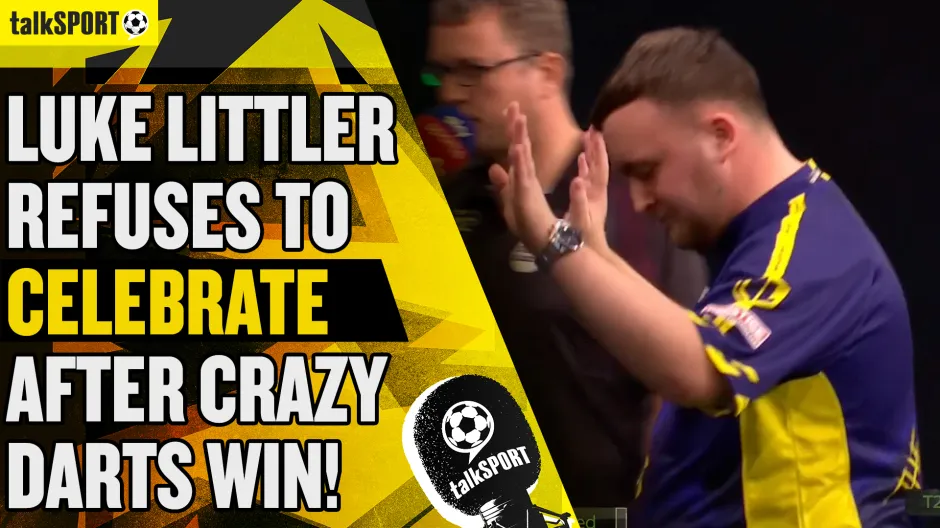
Luke Littler’s remarkable comeback at the Grand Slam of Darts against reigning World Grand Prix champion Mike De Decker became one of the most memorable matches of the tournament, though the young Englishman showed little inclination to celebrate his victory. The encounter between Littler and De Decker offered high drama, shifting momentum, and controversy, leaving fans in awe of Littler’s resilience while raising questions about crowd behavior and match officiating.
From the outset, De Decker appeared in formidable form, racing to a commanding lead. With a scorching average of over 116 and breaking Littler’s throw twice, De Decker surged ahead to a 4-3 lead, displaying why he is considered one of the sport’s elite. It was clear to many in the audience that Littler, despite his undeniable talent, was facing a daunting challenge. But Littler refused to bow out without a fight, leveling the contest even as the Belgian regained control and widened the gap to 8-4.
Throughout the match, the crowd’s partiality was evident. Littler enjoyed significant support, with many in attendance loudly cheering him on and whistling during De Decker’s throws. The tension was palpable, and for De Decker, the atmosphere added another layer of difficulty to an already demanding contest. Nevertheless, he maintained his composure, continuing to press forward.
The match’s turning point came when Littler found his form and began to claw his way back. In the 14th leg, he broke De Decker’s throw before holding his own serve, narrowing the scoreline to 8-7. His confidence seemed to swell with each dart, and the crowd’s fervent support only intensified. As the legs wore on, both players showcased their immense talent and nerves of steel. It all came down to a deciding leg at 9-9—a thrilling climax to an already captivating battle.
With victory within reach, Littler displayed extraordinary poise. His final throw landed on D8, sealing the win and completing his stunning comeback. Yet instead of erupting in celebration, the teenager raised his hands in a gesture of what appeared to be contrition. His subdued reaction reflected the emotional toll of the match and his respect for his opponent. In his post-match interview with Sky Sports, Littler expressed mixed feelings about his performance. “I don’t know if I enjoyed that,” he admitted. “I’ve got to feel for Mike. I didn’t think I was in the game, but I know I can always switch that gear.”
Reflecting on his approach, Littler noted, “Early on, I was at my normal pace, but towards the end, I was taking an extra second, and that helped me—I might have to throw like that from now on.” Littler also acknowledged his own disbelief at overturning the deficit, admitting, “Coming onto the stage [for the last session], I didn’t think I could overturn the deficit. I just cannot believe it.”
The match, however, was not without its controversy. De Decker was visibly frustrated by the crowd’s behavior, particularly the whistling that occurred whenever he was at the oche. Speaking to Viaplay, he did not hold back in his criticism, specifically questioning the officials’ actions—or lack thereof. “I asked Kirk Bevins (official) to address the crowd, but he wouldn’t even do that,” De Decker said, expressing his dissatisfaction with the handling of the situation. “Why is he even there then?” he added, highlighting the impact the crowd noise had on his focus and performance.
Bevins, for his part, later responded to the controversy via social media. Reacting to a post from Sky Sports commentator Abigail Davies, who condemned the whistling, Bevins explained the difficulty of managing such disruptions. “Hear hear. The crowd just gets worse when referees address the crowd,” he wrote. Bevins also mentioned that John McDonald, the MC, had previously attempted to calm the crowd during a break, but the effort only seemed to exacerbate the situation. “If you see someone whistling, report it to security and get them kicked out,” Bevins advised, emphasizing the challenges officials face in managing rowdy audiences.
Despite the controversy, Littler’s performance has earned him a spot in the quarter-finals, where he will face Dutch talent Jermaine Wattimena. As Littler prepares for his next challenge, the match against De Decker will undoubtedly remain etched in his memory—and in the minds of fans—as a testament to his grit and determination. For De Decker, it was a hard-fought battle that ended in disappointment, but his sportsmanship and skill were evident throughout.
Looking ahead, the focus will now shift to whether Littler can replicate his comeback heroics against Wattimena. Regardless of the outcome, his victory over De Decker has already solidified his reputation as one of the sport’s most promising talents, capable of rising to the occasion under intense pressure.
Leave a Reply